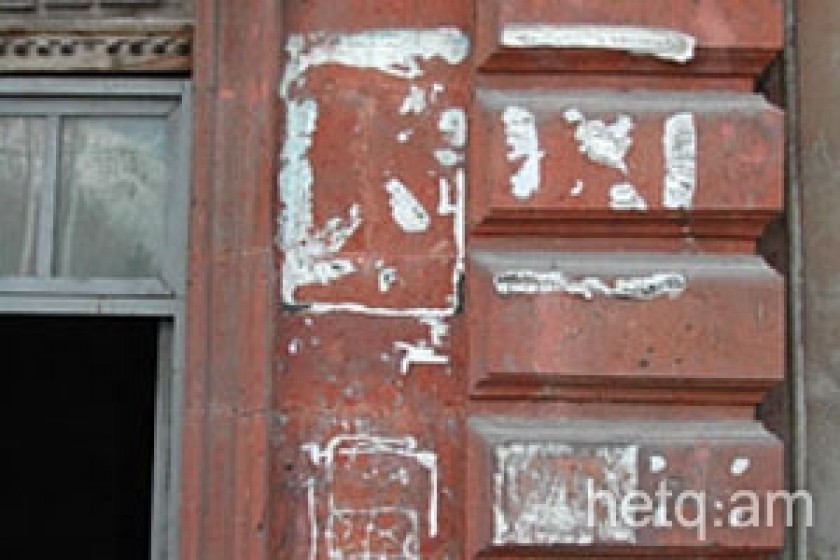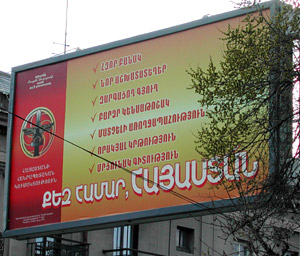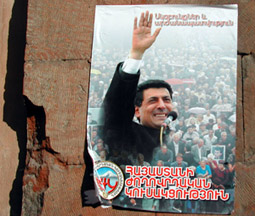
Competition Without Ideology
The walls of our city still bear the remnants of posters from the parliamentary elections held four years ago.
This year, political parties and majoritarian candidates have, in some cases, put up their posters in the same places, but have more often sought new walls to declare their message to the electorate.
A trip through the center ofYerevanreveals the main messages that parties and politicians are trying to impress upon the populace.
Let us begin with the Armenian Revolutionary Federation (Dashnaktsutyun), whose posters are everywhere.
 “Dashnaktsutyun is our old friend” says the ARF. It's not a bad slogan, if only it were true. It befits the Armenian Communist Party more, since they are old friends for a majority of the population, who reminisce about that party with nostalgia these days.
“Dashnaktsutyun is our old friend” says the ARF. It's not a bad slogan, if only it were true. It befits the Armenian Communist Party more, since they are old friends for a majority of the population, who reminisce about that party with nostalgia these days.
The slogan “Dashnaktsutyun is our old friend” would be more fitting if the ARF were participating in the elections for the first time and felt the need to remind the electorate of who they were. However, after their 2003 slogan “Let's change our lives,” the Dashnaks should have now made some sort of declaration about the changes that were made, rather than remind everyone of their old but suspicious friendship. The 2003 slogan “Let's change our lives” was a promise and suggested the involvement of the people.
This time, the slogan is a failed attempt at developing the 1999 slogan “Old friends never betray” and seems to be a slight against the Prosperous Armenia party, which was established only recently. The friendly pictures on the ARF posters are reminiscent of Armentel's billboards advertising lowered tariffs. The ARF banners and posters contain no promises.
 No promises are made by the Republican Party of Armenia's (RPA) slogan either. In 1999, it was “Let us build and protect” followed by “Let's rely on our minds and hands” in 2003. While these two suggest action of some sort (building, protecting, relying), the RPA slogan this year does not even have a verb – “For you,Armenia”. It is difficult to imagine any other country for which Armenian political parties would be participating in elections and it is obvious that this indecisive slogan is because of a lack of something to say. This is also clear from the design of the posters – there is nothing to show the party's attitude towards voters, and because they use red and yellow prominently, it is easy to confuse these posters with those advertising Viva Cell's Alo cards.
No promises are made by the Republican Party of Armenia's (RPA) slogan either. In 1999, it was “Let us build and protect” followed by “Let's rely on our minds and hands” in 2003. While these two suggest action of some sort (building, protecting, relying), the RPA slogan this year does not even have a verb – “For you,Armenia”. It is difficult to imagine any other country for which Armenian political parties would be participating in elections and it is obvious that this indecisive slogan is because of a lack of something to say. This is also clear from the design of the posters – there is nothing to show the party's attitude towards voters, and because they use red and yellow prominently, it is easy to confuse these posters with those advertising Viva Cell's Alo cards.
The erstwhile leader of the opposition, Stepan Demirchyan's People's Party, has come forth with the slogan “Principles and honor,” which also lacks action. For the most part, the slogan used by the Justice bloc in the 2003 elections - “There is no other way” - lacked action as well. But while “There is no other way” bore the promise of a change in leadership, “Principles and honor” seems to be a feeble attempt at self-justification.
There seemed to be no progress in creativity for the National Union party's posters either. In 2003, this party suggested that we save the Fatherland together, this year they say “United we will save the Fatherland”.
 |
 |
Both the People's Party and National Union prominently display their leaders on their posters. One can assume that they either did not wish to spend money on design, or feel that the most popular pictures among the voters are their own faces.
 The Allianceparty is also represented by one person on their posters. Samvel Babayan's “Strength and unity” completes our list of slogans promising nothing.
The Allianceparty is also represented by one person on their posters. Samvel Babayan's “Strength and unity” completes our list of slogans promising nothing.
The Country of Law party has also displayed the portraits of their leader, or leaders.
Some of the posters bear only the picture of Arthur Bagdasaryan, while others display the trinity of Baghdasaryan, Shahgeldyan and Bisharyan. In both cases, the slogan - compared to the 2003 message of “Your law in your country” - is a lot longer and more aggressive - “We are fighting for a dignified life, law and justice.”
 They also have sub-slogans like “Law and justice” and “We deserve to live in a country of law”. The shake-up that occurred in May last year rocked this party's mental equilibrium and this has come through in their attempts to write everything on one poster.
They also have sub-slogans like “Law and justice” and “We deserve to live in a country of law”. The shake-up that occurred in May last year rocked this party's mental equilibrium and this has come through in their attempts to write everything on one poster.
A trinity of faces is also typical of the Democratic Way party posters.
Manuk Gasparyan, the founder of the party, is accompanied by Aghasi Arshakyan, who had been left out of the National Union party list as well as Arshak Sadoyan, who was left on the streets after the Justice bloc was dissolved.
The latter two have been in Parliament for around seventeen years already, while Manuk Gasparyan, once a shopkeeper, ended up as a parliamentarian by chance.
 All three of them seem to feel the danger of being left out of “big politics” and therefore make the declaration “Let us return the power to the people,” probably interpreting this as their own presence in Parliament.
All three of them seem to feel the danger of being left out of “big politics” and therefore make the declaration “Let us return the power to the people,” probably interpreting this as their own presence in Parliament.
The United Labor Party (ULP) is campaigning with what seems to be a lazy effort at coming up with a slogan. Instead of thinking up their own approach, this political power – which seems to have serious potential to enter Parliament – says “We want what you want,” leaving the voter to come up with the rest.
The United Liberal National Party (ULNP), an unknown organization, has come up with a slogan that seems quarrelsome in nature – “The Diaspora is a source of knowledge, not a bag of money.”
The posters of Prosperous Armenia may be fewer that the Dashnaktsutyun's in number, but are unrivalled in variety. They bear one main slogan – “Let us build a prosperous country together.” The party leader, one of the most influential oligarchs in the country, Gagik Tsarukyan, invites the voter to build a prosperous country without giving any indication of what kind of country that should be.
 |
 |
A friend of mine, who runs a non-government organization that has been working for a long time in the Gegharkunik provincial region, once told me that there are villages where none of the houses have a bathroom or toilet. “Prosperous” means one thing to those people, while it means something else to those living in the Ararat valley, and is something totally different to those residing in cities.
 Prosperous Armeniahas used a general statement for everyone. Upon first reading it, one seems to be slightly shaken; on reading it a second time, one understands thatArmeniahas already reached where it was headed over the past few years. Another slogan, “The strong must be fair, the weak protected,” contradicts article 1 of the Armenian Constitution – “The Republic of Armenia is a sovereign, democratic, social state governed by the rule of law” and article 14.1 – “Everyone is equal before the law.” Thus, this new party, which has great potential, is not concealing – moreover, they are presenting it as their slogan – their model of a prosperous country, consisting of a minority of (fair) strong people and a majority of (protected) weak people, and that a youth seeking an education or a man seeking employment must be protected by a party hastily founded by a wealthy individual. The ‘masterpiece' of their “I want…., I choose…” series of billboards is on the Khanjyan-Vardanants intersection, where an artist declares that he wants to create, which is why he will vote for Prosperous Armenia.
Prosperous Armeniahas used a general statement for everyone. Upon first reading it, one seems to be slightly shaken; on reading it a second time, one understands thatArmeniahas already reached where it was headed over the past few years. Another slogan, “The strong must be fair, the weak protected,” contradicts article 1 of the Armenian Constitution – “The Republic of Armenia is a sovereign, democratic, social state governed by the rule of law” and article 14.1 – “Everyone is equal before the law.” Thus, this new party, which has great potential, is not concealing – moreover, they are presenting it as their slogan – their model of a prosperous country, consisting of a minority of (fair) strong people and a majority of (protected) weak people, and that a youth seeking an education or a man seeking employment must be protected by a party hastily founded by a wealthy individual. The ‘masterpiece' of their “I want…., I choose…” series of billboards is on the Khanjyan-Vardanants intersection, where an artist declares that he wants to create, which is why he will vote for Prosperous Armenia.

Ten of the twenty four parties and one bloc competing for proportional seats in the Parliament are campaigning in the center ofYerevan, if this can be called campaigning or an ideological battle.
 Videos
Videos Photos
Photos
Write a comment